Beetroots are an incredibly popular vegetable that adds great nutritional value to meals and smoothies.
However, we often stick to eating the main, beet part of the beetroot.

This means that the leaves are often discarded or wasted.
If you regularly consume beets and are wondering if you can eat the leaves as well instead of throwing them away, read on.
Can You Eat Beet Leaves?
The short answer to this question is, yes.
In fact, not only are beet leaves perfectly edible, but they are also bursting with nutrients that can help to support your health and well-being.
Even better, beet leaves can be consumed raw or cooked which makes them super versatile.
You can add them to salads and smoothies for a quick boost of nutrients and flavor, or you can cook them and add them to stir-fries, curries, and stews.
Can You Eat Beet Leaves Raw?
Yes, as we mentioned above, it is perfectly safe for beet leaves to be consumed raw.
In fact, when you consume beet leaves raw, you retain more of the vitamins and minerals that make them so good for you.
One of the best ways to consume beet leaves raw is by simply adding some fresh lemon juice and olive oil to the leaves.
The lemon juice in particular helps you make the most of these often overlooked leaves.
The vitamin C content helps your body to better absorb the high iron content of the leaves that helps your body transport oxygen in your blood.
Raw beet leaves also make a great substitute for other lettuce leaves or spinach in salads and sandwiches.
This can be a simple way to change up meals that you eat regularly to prevent them from becoming boring.
Health Benefits Of Eating Beet Leaves
As with most vegetables, there are plenty of health benefits that you can get from regularly consuming beet leaves.
Improved Blood Pressure
One of the best things about making beet leaves a part of your regular diet is the effect they can have on your blood pressure.
These unassuming leaves are high in nitrates which help the body to relax and dilate blood vessels.
This opens up your blood vessels and allows the blood, rich with nutrients and oxygen, to travel around your body much more easily and at a lower pressure.
This results in better circulation throughout the body.
Reduced Risk Of Heart Disease
Blood pressure isn’t the only thing that is positively affected by consuming beet leaves in your diet.
Beet leaves are high in folate and betaine.
When these two nutrients come together, they are scientifically proven to work together to reduce levels of homocysteine in the blood.
Homocysteine is a chemical that the body uses to create proteins.
However, if the levels of this chemical are too high, it can lead to artery damage and even heart disease.
Reducing these levels with beets can help to protect your heart.

Improved Stamina
If you have ever seen an athlete’s sample for a pee drug test, you might have noticed that the color is more crimson than yellow.
This is because a lot of athletes make beets and their leaves part of their regular diet.
The nitrates that are found in beet leaves have been found to potentially increase endurance performance.
However, it takes between four and five beets worth of leaves to see a marked improvement in stamina and endurance.
The peak boost will be noticeable around two or three hours after consumption.
Therefore, timing is important if you want to reap this benefit.
Improved Brain Function
Another benefit of the nitrate content in beet leaves that isn’t as time-sensitive is improved cognition.
As we mentioned above, the nitric oxide that is produced from nitrate helps to relax and dilate the blood vessels.
This increases the blood flow to the brain and provides more oxygen.
Increasing the flow of blood to the brain helps it to function properly.
This is particularly important as we begin to age.
The older we get, the more our brain’s ability to metabolize energy and its neuron activity decreases.
Our body also begins to struggle to create nitric oxide.
Consuming beet leaves regularly can help to protect your brain and keep it sharp.
Better Liver Health
Another important organ in our body is our liver.
It is responsible for metabolic functions and helps our immune system.
It is also tasked with cleaning our blood and detoxifying our bodies.
Consuming beet leaves and beetroots on a regular basis can help to keep your liver in tip-top condition.
The betaine content of beet leaves has the ability to protect the liver in people who suffer from fatty liver disease that was not brought on by alcohol.
Betaine can also help to prevent other liver diseases from developing.
Improved Digestive Health
Beet leaves, like many leafy vegetables, are high in fiber.
Fiber is super important to have in our diets.
It plays a huge role in protecting our digestive health and ensuring that issues such as constipation are kept at bay.
The high fiber content of beet leaves can help to keep your bowel movements regular and improve your body’s ability to absorb nutrients from your food.
It can also increase the amount of good bacteria in your gut.
Chronic Disease Prevention
Beet leaves are rich in betalains.
Betalains are a class of anti-inflammatories and antioxidants.
This can help protect against chronic diseases such as obesity, heart disease, and some forms of cancer.
They can also help to rid your body of excess free radicals.
Final Thoughts
Beet leaves are often the overlooked part of the plant.
However, there is no need to discard this part of the plant next time you enjoy some fresh beets.
There are so many health benefits that you can get from these leaves both raw and cooked.

Ingredients
- 2 beet
- 1 tablespoon olive oil
- 2 cloves garlic
- ¼ teaspoon red pepper flakes
- salt
- black pepper to taste
- 2 lemons
Instructions
- Large saucepan of lightly salted water should be brought to a boil. Beet greens should be added, cooked uncovered for about 2 minutes, until tender, and then drained in a strainer.
- To stop the cooking process, immediately submerge in freezing water for several minutes.
- Once the greens are chilled, cut them coarsely after thoroughly draining.
- A big skillet with medium heat is used to heat the olive oil. Add the garlic and red pepper flakes, and heat and stir for approximately a minute, or until fragrant. Greens should be coated after being added, then salt and pepper should be added. Greens should only be heated for one to two minutes. Lemon wedges are recommended.
